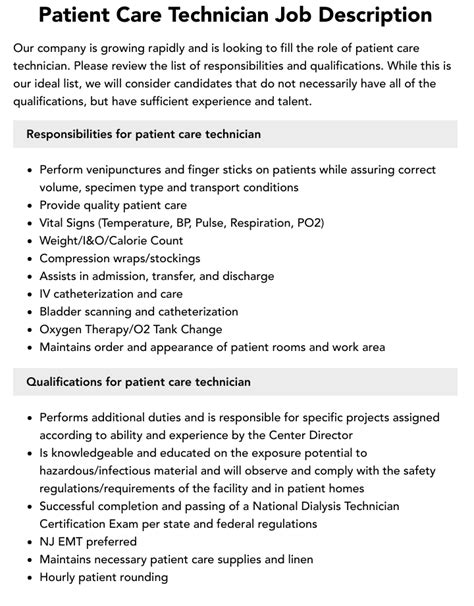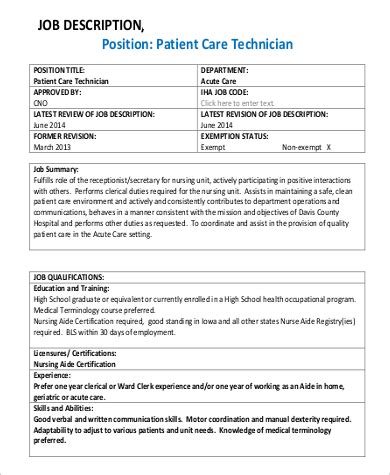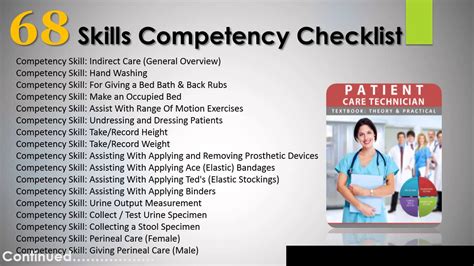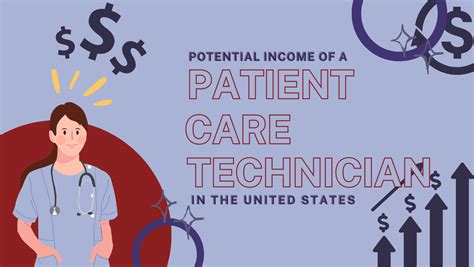Intro
Discover the essential role of a Patient Care Technician in healthcare. Learn about the job description, responsibilities, and skills required to excel in this position. Explore the daily tasks, patient interaction, and medical procedures involved in this rewarding career, and find out how to become a vital part of a healthcare team.
As the healthcare industry continues to grow and evolve, the role of patient care technicians has become increasingly important in providing high-quality patient care. Patient care technicians, also known as nursing assistants or patient care assistants, play a vital role in supporting healthcare professionals and ensuring that patients receive the best possible care. In this article, we will explore the patient care technician job description and responsibilities in detail.
The demand for patient care technicians is on the rise, driven by an aging population and an increased focus on patient-centered care. According to the Bureau of Labor Statistics, employment of nursing assistants, including patient care technicians, is projected to grow 9% from 2020 to 2030, faster than the average for all occupations. This growth creates a wealth of job opportunities for individuals interested in pursuing a career in healthcare.

Patient Care Technician Job Description
A patient care technician is a healthcare professional who assists with the daily care of patients under the supervision of a registered nurse or other healthcare professional. Their primary responsibility is to provide basic care and support to patients, ensuring their comfort, safety, and well-being.
Patient care technicians work in a variety of healthcare settings, including hospitals, nursing homes, clinics, and assisted living facilities. They may work with patients of all ages, from infants to older adults, and may specialize in specific areas such as pediatrics, gerontology, or oncology.
Patient Care Technician Responsibilities
The responsibilities of a patient care technician may vary depending on the healthcare setting and the specific needs of the patients. Some common responsibilities include:
- Assisting patients with daily living activities such as bathing, dressing, and grooming
- Taking vital signs, including temperature, pulse, and blood pressure
- Assisting with mobility and transfers, such as helping patients walk or move from one location to another
- Providing basic care and support with activities such as feeding, toileting, and incontinence care
- Monitoring patients' conditions and reporting any changes or concerns to the nurse or other healthcare professional
- Assisting with medical procedures, such as drawing blood or preparing patients for exams
- Maintaining a clean and safe environment for patients, including cleaning equipment and supplies
- Communicating effectively with patients, families, and healthcare professionals to ensure that patients' needs are met

Requirements and Qualifications
To become a patient care technician, individuals typically need to complete a training program in patient care technology or a related field. These programs are usually offered at vocational schools, community colleges, or online institutions and may lead to a certificate, diploma, or associate's degree.
Some common requirements and qualifications for patient care technicians include:
- High school diploma or equivalent
- Completion of a patient care technology training program
- Certification as a nursing assistant or patient care technician (requirements vary by state)
- Basic life support certification, such as CPR
- Strong communication and interpersonal skills
- Ability to work effectively in a team environment
- Compassion and empathy for patients and families
Patient Care Technician Skills
Patient care technicians need to possess a range of skills to perform their job effectively. Some key skills include:
- Basic care and support skills, such as bathing and dressing patients
- Vital sign measurement skills, including temperature, pulse, and blood pressure
- Mobility and transfer skills, including assisting patients with walking and moving
- Communication and interpersonal skills, including effective communication with patients, families, and healthcare professionals
- Time management and organizational skills, including prioritizing tasks and managing multiple patients
- Critical thinking and problem-solving skills, including identifying and reporting changes in patients' conditions

Work Environment
Patient care technicians work in a variety of healthcare settings, including hospitals, nursing homes, clinics, and assisted living facilities. They may work in fast-paced environments, such as emergency departments or operating rooms, or in slower-paced environments, such as long-term care facilities.
Patient care technicians may work irregular schedules, including nights, weekends, and holidays. They may also be exposed to infectious diseases and other health risks, and may be required to wear personal protective equipment, such as gloves and masks.
Patient Care Technician Salary
The salary for patient care technicians varies depending on the healthcare setting, location, and level of experience. According to the Bureau of Labor Statistics, the median annual salary for nursing assistants, including patient care technicians, was $30,830 in May 2020.
Here are some average salary ranges for patient care technicians in different healthcare settings:
- Hospitals: $32,000 - $45,000 per year
- Nursing homes: $28,000 - $40,000 per year
- Clinics: $30,000 - $42,000 per year
- Assisted living facilities: $25,000 - $35,000 per year

Conclusion
In conclusion, patient care technicians play a vital role in providing high-quality patient care in a variety of healthcare settings. They assist with daily living activities, take vital signs, and provide basic care and support to patients. To become a patient care technician, individuals typically need to complete a training program and obtain certification. Patient care technicians need to possess a range of skills, including basic care and support skills, vital sign measurement skills, and communication and interpersonal skills.
If you're interested in pursuing a career as a patient care technician, we encourage you to explore the many resources available to you. With the right training and certification, you can embark on a rewarding career in healthcare and make a positive impact on the lives of patients and families.
What is a patient care technician?
+A patient care technician is a healthcare professional who assists with the daily care of patients under the supervision of a registered nurse or other healthcare professional.
What are the responsibilities of a patient care technician?
+Patient care technicians assist with daily living activities, take vital signs, and provide basic care and support to patients. They may also assist with medical procedures and maintain a clean and safe environment for patients.
How do I become a patient care technician?
+To become a patient care technician, you typically need to complete a training program in patient care technology or a related field. You may also need to obtain certification as a nursing assistant or patient care technician.
